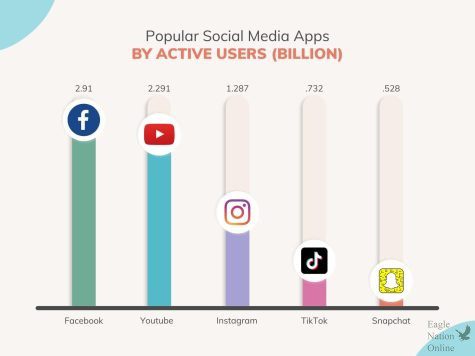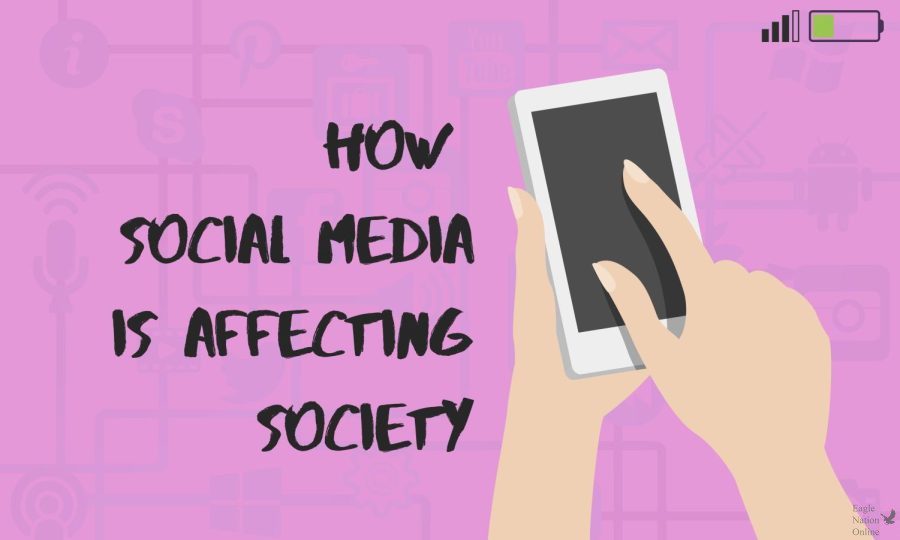Editorial: Improper use of social media harms society
In a digitally constructed image by senior graphic designer Caitlyn Richey, two hands holding a phone are pictured over a background with a hidden web of social platforms and icons. This is to represent that the true effects of social media and social platforms are often hidden at first and overlooked, but they are always there. “Social media has the potential to have an incredibly positive impact,” Richey said. “But we must be aware of the extremely negative impact it can have if used unwisely.”
The term ‘social media’ was originally coined in 1997 to describe digital platforms that provide people with the means to communicate, participate in a social environment and be entertained.
In the early 2000s, MySpace became the first platform to reach over a million monthly users. Over the years, countless other platforms have risen to popularity, including Facebook, Instagram, YouTube, Snapchat, Pinterest and TikTok.
According to the American Academy of Child and Adolescent Psychiatry (AACAP), 90% of teens from the ages of 13-17 have social media, and, of that number, 75% report having an active profile.
What kind of impact is this having on society and especially the rising generation?
There are many positive influences social media can and does have when used with moderation and wisdom, but it is important to bring awareness to how negative of an influence it can have when abused.

Social media is causing a decline in crucial social skills
Many youth are missing out on learning how to start and to hold meaningful conversations with their peers and adults, make new friends and be good friends to others – face-to-face.
A survey taken by Common Sense Media in 2018 revealed that 35% of teens say their favorite method of communication is texting, while 16% say social media and 10% say video chatting. These “preferred” methods of communication take the majority in the rising generation, and, as time passes, many teens will become less and less comfortable interacting face-to-face because they cannot hide behind a screen.
Social media provides instant gratification and extreme speed in researching and messaging. Switching between screens rapidly and always looking for the “next best thing” shortens the attention span when instant results are not so accessible.
Statistics show that the average person becomes frustrated after waiting just 16 seconds for a web page to load, 25 seconds for a stoplight to turn green, 30 seconds of waiting in line or 18 seconds of searching for a pen.
Not only is social media making society more impatient, but it is also decreasing the ability of teens and adults alike to make eye contact during one-on-one conversations. Staring at a screen so often has caused many to forget this crucial skill that allows for connections to be made, while adding meaning to a conversation and displaying confidence.
Social media is taking a toll on our physical and mental health
Social media feeds have been designed to draw in users and “feed” them the endless temporary satisfaction that social media provides. According to Instagram, “When you open Instagram or refresh your feed, the photos and videos [they] think you care about most will appear towards the top of your feed.”
Being constantly presented with new media and entertainment leads many to remain on devices late into the night (a sign of developing technology addiction,) while also losing valuable sleep. A British study performed in 2018 confirmed that social media use is connected with “decreased, disrupted and delayed sleep, which is associated with depression, memory loss and poor academic performance.”
The average study shows that people spend 2-3 hours each day on social media platforms, and the National Bureau of Economic Research found that 31% of social media use is the result of a lack of self-control. If we cannot control our use of social media, what other aspects of our lives will we lose control of?
Social media, and technology in general, produces a chemical reaction in our brains that involves dopamine receptors and transmitters. Dopamine is a chemical in the brain that motivates behavior, and in a sense rewards us for beneficial behaviors. The brain releases this chemical when social media successfully brings one validation and peer approval. The way that human brains have become wired to crave technology-related activities is similar to the way that the brains of drug addicts are affected – because of this, many people are becoming uncontrollably addicted to this form of media. The use of social media creates “dopamine loops.”
Social media can present a false reality – a facade of people’s best, and a narrow lens of experiences and actual situations. Many fail to remember that everyone’s best is different, and no one’s experiences, life situations or efforts will look the same as another’s.
The pursuit of perfection that social media promotes promotes an increasing problem, because it is a simply unattainable goal – there is no set definition of what it means to achieve perfection. Many social media users suffer from mental illnesses because of this issue, and have to fight anxiety, depression, comparison, isolation and poor body image.
Cyberbullying – which is the sending or sharing of any form of hurtful, false, negative or inappropriate content about someone else that will bring them humiliation or embarrassment, is only perpetuating these mental illnesses.
Over the years, this issue has become more prominent, as social media has made it much easier for people to share such destructive content and voice their opinions – even if it is hurtful.
There are many positive influences social media can and does have when used with moderation and wisdom, but it is important to bring awareness to how negative of an influence it can have when abused.
— Caitlyn Richey
Behind the screen, many feel much more secure speaking their minds, even if it comes at the cost of another. This can have devastating effects on teens and youth, and perpetuate other problems, as well.
It is clear that social media, when used improperly, can have incredibly destructive effects on mental and physical health – and on social skills. As this decline becomes steeper, society as a whole will suffer.
It is up to the individual to do something about this issue. If society works together to use social media as a tool to connect with and uplift others, a more positive social environment will be cultivated and many of these issues will be able to be avoided.
Here are just a few suggestions of how you can start today:
- Turn your phone off for the day and spend time with family
- Uninstall social media for a week and talk to your friends in person about what they’ve been up to
- Post an uplifting quote or message
- Reach out to someone who is struggling
- Leave your phone outside of your room for the night, and give yourself the gift of a better night’s sleep
- Before “liking” a post, consider if it’s something you really support
- Be genuine in what you share
- Take time to think about the purpose behind your post
Your donation will support the student journalists of Prosper High School. Your contribution will allow us to purchase equipment and cover our annual website hosting costs.

Certifications
Adobe Photoshop Certified Associate
Adobe Illustrator Certified Associate
Awards
Best of SNO: Column: Senior reflects on life without influence of social media
Award of Journalistic Excellence
Honors
Prosper High School Class of 2022 - Top 10%
National Society of Collegiate Scholars Member
National Society of High School Scholars Nominee
National Society of Leadership & Success Nominee
Phi Theta Kappa Honor Society Nominee
National English Honor Society Prosper High School Chapter (2021-present)
National Honor Society Prosper High School chapter member (2019-present)
Mu Alpha Theta Prosper High School Chapter Member (2020-present)
Rho Kappa Prosper High School Chapter Member (2020-present)
American Sign Language Honor Society (2018-present)
PHS American Sign Language Club (2018-present)
PHS Diverse & Inclusive Society
















